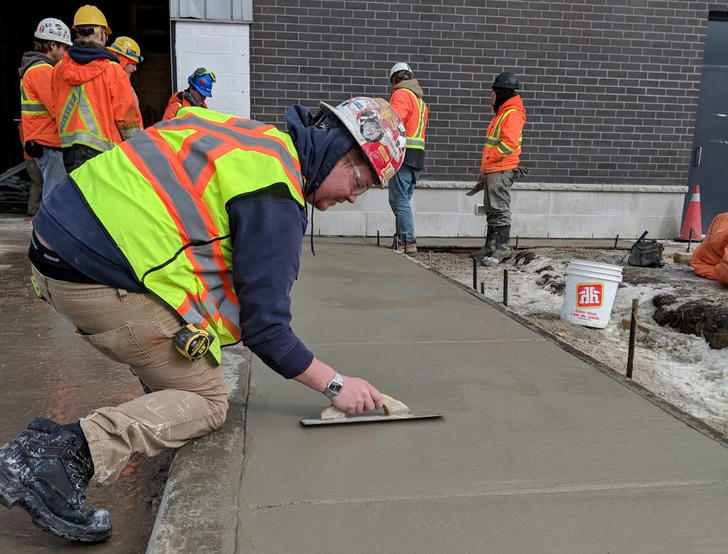🧱 Concrete Worker Jobs in the U.S.: Real-World Overview and Job Advantages
Concrete worker jobs offer a strong entry point into the U.S. construction industry, and the demand for skilled workers continues to grow across the country. These roles combine stable income and low entry requirements; many positions do not require formal education or prior experience.

✅ Why Choose a Concrete Worker Job?
Low Entry Barrier: Many roles available for individuals without prior experience
Growing Demand: Infrastructure projects and residential construction are driving demand
Skill-Based Pay: Wages increase with experience and specialization (e.g., finishing, cutting)
Outdoor Work: Ideal for those who enjoy hands-on, physical tasks in open-air environments
Promotion Paths: Lead roles and site coordination positions available with experience
Union Access: Many regions offer union jobs with strong benefits and safety protections
💵 Average Salaries by City (2024 Estimates)
| City | Hourly Wage | Estimated Annual Salary |
|---|---|---|
| New York, NY | $24 – $35/hr | $49,000 – $72,000 |
| Los Angeles, CA | $23 – $34/hr | $47,000 – $70,000 |
| Dallas, TX | $21 – $31/hr | $44,000 – $65,000 |
| Chicago, IL | $22 – $33/hr | $46,000 – $69,000 |
| Phoenix, AZ | $20 – $30/hr | $42,000 – $62,000 |
Entry-level concrete workers make between $15 and $25 per hour, while senior security guards make between $25 and $35 per hour on average. Salaries vary depending on the location, requirements, and other conditions of the job.
Salaries depend on experience, location, and project type. Union jobs often include structured raises.
🎁 Common Benefits Offered
Health Insurance: Includes medical, dental, and vision (offered by most full-time employers)
Paid Time Off: Vacation, sick leave, and holidays (especially with union contracts)
Travel Allowance: Some companies offer mileage reimbursement or temporary housing
Training Support: Access to certification programs like OSHA, equipment operation, etc.
Injury Protection: Full workers’ compensation for job-related injuries or accidents
Career Advancement: Possibility to move into supervisory, site lead, or training roles
👥 Who Is This Job Suitable For?
Concrete work is well-suited to a wide range of age groups, provided the individual can meet the physical demands of the role.
| Age Group | Suitability Description |
|---|---|
| 18–25 | Ideal for entry-level workers looking to build trade skills from scratch |
| 26–40 | Strong option for career changers seeking stability and advancement |
| 41–55 | Experienced workers often move into foreman, training, or team leadership |
| 56+ | May transition into less physically intense roles such as supervision or equipment operation |
🎓 Entry Requirements
Education: No college required; high school diploma or GED preferred but not mandatory
Experience: Entry-level positions available with on-site training
Age: Must be 18+ and physically fit for outdoor work
Legal Eligibility: Must have valid work authorization in the U.S.
Training Pathways: On-the-job training, union apprenticeships (e.g., OPCMIA), or technical school
🔍 Where to Find Concrete Worker Jobs
• Job Boards: Indeed, ZipRecruiter, SimplyHired, Glassdoor
• Contractors: Turner Construction, Kiewit, Flatiron Construction, PCL Construction
• Unions & Trade Schools: OPCMIA, Associated Builders and Contractors (ABC), local apprenticeship programs
• State Programs: Regional workforce training initiatives, technical college job placement offices
✅ Final Thoughts
Concrete worker jobs provide a practical and stable career option for individuals who enjoy physical work and want to learn a valuable trade. With growing infrastructure needs and strong demand across the country, it’s a path that offers long-term potential, job security, and the chance to build something real—literally.
